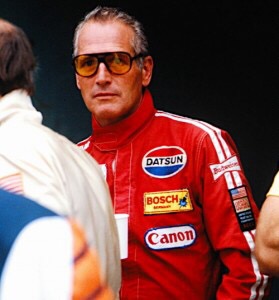
Paul Newman, known as a major movie actor for most of his life, was about 48 years old when he first stepped into a race car (The same age where I did the same), and more than 80 years old when he won his last and final race.
Newman once said that “Motorsports was the first sports he ever found any grace in.” I have to say, this is also the way I feel about Motorsports. Meaning, growing up I was okay in organized sports in school — such as basketball, football, even track and field — but I was never extraordinary in any of these things.
I likewise have found ‘elegance in Motorsports.’ I’m actually good at it, which of course creates more confidence, connection and connectivity, which of course, makes me even more comfortable ~ in a race car. In short, I get it. I get what attracted Paul Newman to Motorsports so.
As if this was not enough connectivity, I have a direct connection to Mr. Newman, through the empowering work of Operation HOPE. You see, Paul Newman’s lead philanthropy, ‘ Newman’s Own,’ actually funded a $100,000 gift to support Operation HOPE’s work in Chicago, IL, through Oprah Winfrey’s ‘Use Your Life’ Awards. But I had no idea then, when this happened, that I would be revisiting the Newman legacy a decade later in this more personal way. Life, is interesting.
This is all inspiration, all by itself. But Paul Newman didn’t stop with a mere fascination with being a race car driver. Amongst other things, Newman co-owned several racing teams during his long and storied career, including Newman-Sharp Racing.
Paul Newman competed in many classes of mostly SCCA auto racing, winning continually in each category, but arguably his proudest achievement was his 1979 second place overall win at the Le Mans 24 Hour Race. He and his team were second overall, and first in their category in this world renown race.
While known worldwide as a movie actor, the reality is that movie star Paul Newman much preferred his life as a race car driver, and his friends in motorsports (to those in his native Hollywood).
 I have provided a comprehensive Wikipedia summary of Paul Newman’s impressive racing career below:
I have provided a comprehensive Wikipedia summary of Paul Newman’s impressive racing career below:
Newman was an auto racing enthusiast, despite being colorblind, and first became interested in motorsports (“the first thing that I ever found I had any grace in”) while training at the Watkins Glen Racing School for the filming of Winning, a 1969 film. Because of his love and passion for racing, Newman agreed in 1971 to star in and to host his first television special, Once Upon a Wheel, on the history of auto racing. It was produced and directed by David Winters, who co-owned a number of racing cars with Newman.[56][57] Newman’s first professional event as a racer was in 1972 at Thompson International Speedway, quietly entered as “P.L. Newman”, by which he continued to be known in the racing community.[58]
He was a frequent competitor in Sports Car Club of America (SCCA) events for the rest of the decade, eventually winning four national championships. He later drove in the 1979 24 Hours of Le Mans in Dick Barbour’s Porsche 935 and finished in second place.[59] Newman reunited with Barbour in 2000 to compete in the Petit Le Mans.[60]
From the mid-1970s to the early 1990s, he drove for the Bob Sharp Racing team, racing mainly Datsuns (later rebranded as Nissans) in the Trans-Am Series. He became closely associated with the brand during the 1980s, even appearing in commercials for them in Japan and having a special edition of the Nissan Skyline named after him. At the age of 70 years and eight days, Newman became the oldest driver to date to be part of a winning team in a major sanctioned race,[61] winning in his class at the 1995 24 Hours of Daytona.[62] Among his last major races were the Baja 1000 in 2004 and the 24 Hours of Daytona once again in 2005.[63]
Sharp/Newman Nissan
During the 1976 auto racing season, Newman became interested in forming a professional auto racing team and contacted Bill Freeman who introduced Newman to professional auto racing management, and their company specialized in Can-Am, Indy Cars, and other high performance racing automobiles. The team was based in Santa Barbara, California and commuted to Willow Springs International Motorsports Park for much of its testing sessions.
Their “Newman Freeman Racing” team was very competitive in the North American Can-Am series in their Budweiser sponsored Chevrolet powered Spyder NFs. Newman and Freeman began a long and successful partnership with the Newman Freeman Racing team in the Can-Am series which culminated in the Can-Am Team Championship trophy in 1979. Newman was associated with Freeman’s established Porsche racing team which allowed both Newman and Freeman to compete in S.C.C.A. and I.M.S.A. racing events together, including the Sebring 12-hour endurance sports car race. This car was sponsored by Beverly Porsche/Audi. Freeman was Sports Car Club of America’s Southern Pacific National Champion during the Newman Freeman Racing period. Later Newman co-founded Newman/Haas Racing with Carl Haas, a Champ Car team, in 1983, going on to win 8 drivers’ championships under his ownership. The 1996 racing season was chronicled in the IMAX film Super Speedway, which Newman narrated. He was a partner in the Atlantic Championship team Newman Wachs Racing.[citation needed]
Having said he’d quit “when I embarrass myself”, Newman competed into his 80s, winning at Lime Rock in what former co-driver Sam Posey called a “brutish Corvette” displaying his age as its number: 81.[58] He took the pole in his last professional race, in 2007 at Watkins Glen International, and in a 2008 run at Lime Rock, arranged by friends, he reportedly still did 9/10ths of his best time.[64]
Newman was posthumously inducted into the SCCA Hall of Fame at the national convention in Las Vegas, Nevada on February 21, 2009.[65]
What a man. Hats off to you, Mr. Paul Newman. Movie star, film director, entrepreneur, professional racing driver and team owner, environmentalist, activist and philanthropist.
Bryant Group Motorsports

